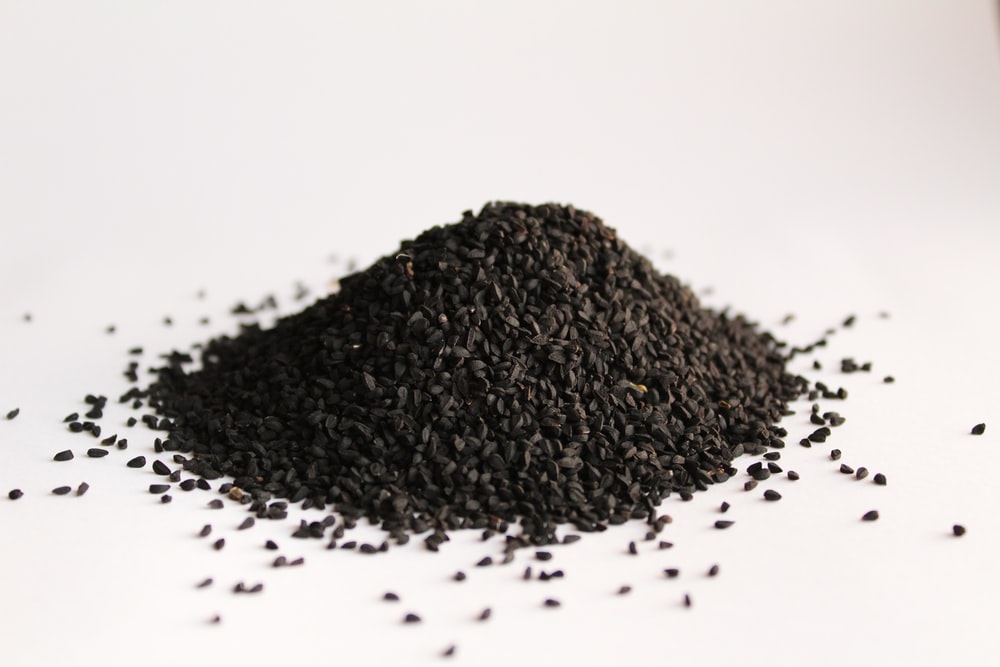
Picture by Jubair Bin Iqbal at Pexels
The modern scientific community is increasingly realizing the value of traditional substances through scientific research. Many substances that have been used as medicine for ailments over the centuries are now getting converted into medicines and supplements for everyday use. One such substance is black seed oil.
Black seed oil is obtained from a plant called Nigella sativa (N. Sativa). It is a small plant that can be found in many parts of the world such as Northern Africa, Southern Europe, the Middle East, and Southwest Asia.
N. Sativa plant produces flowers and fruits. The fruits of this shrub contain tiny black seeds which are known as N. Sativa seeds or, simply, black seeds. Other names for N. Sativa seeds include Roman coriander, fennel flower, nigella, black caraway, and black cumin.

Picture by Skyler Ewing at Pexels
Oil extracted from black seeds has been a popular source of medicine for a range of ailments for thousands of years in traditional medicine.
Several studies have explored the potential benefits of black seed oil and found that it has several health applications such as helping in weight loss and asthma treatment.
Potential Benefits of Black Seed Oil
Traditionally, black seed oil has been believed to have healing potential to treat a range of ailments and problems. That is why it has been called a universal healer or “panacea”.
It must be noted that many of the benefits of black seed oil traditionally thought to be effective did not stand the test of research. Still, there is a range of benefits that did turn out to be right.
Some of the benefits are given as follows.
Antioxidant Activity
One of the biggest benefits of the black seed oil is that it is rich in antioxidants. Antioxidants are substances that provide protection to us at a cellular scale by protecting our cells from the accumulation of something called free radical agents.
Free radical agents, while beneficial to us up to an extent, can be harmful if they are allowed to accumulate in large amounts. That is why antioxidant action is needed in our body that regulates the presence of free radicals throughout our bodies.
Antioxidants also help reduce inflammation. Through this fight against free radicals and anti-inflammatory action, antioxidants can be extremely beneficial in maintaining the proper functioning of our bodies and protecting us against a range of diseases such as cancer, Alzheimer’s disease, and heart disease.
The black seed oil has an abundance of a strong anti-inflammatory agent and antioxidant known as thymoquinone. That is why the oil has been proven to have strong anti-inflammatory and antioxidant effects.
Thymoquinone itself does not have a strong antioxidant effect but our body converts it into thymohydroquinone, the reduced form of thymoquinone. This reduced form has a huge antioxidant effect as it scavenges free radicals from all over. This gives thymoquinone anticancer properties and neuroprotective properties in our bodies.
Thus, black seed oil can be considered a strong contender for the treatments requiring antioxidation.
Treatment of Asthma

Picture by Sahej Brar at Unsplash
Another traditional benefit of the black seed oil is its potential to treat asthma. Asthma makes it difficult for the patient to breathe by constricting the muscle through swelling of the airways.
Many research studies have found that thymoquinone in black seed oil may be highly effective in relaxing the airway muscles during asthma by decreasing inflammation significantly.
In a randomized, double-blind, and placebo-controlled study by Abdulrahaman Koshak and his team, 80 patients with asthma were divided into two groups. The experimental group received capsules of black seed oil for four weeks while the control group received a placebo.
At the end of the study, those who received the black seed oil capsule treatment showed significant improvement in pulmonary function and improved asthma control. This shows the treatment potential of black seed oil in treating asthma.
However, further studies with larger sample sizes may be needed to cement the treatment’s efficacy.
Weight Loss Benefits

Picture by Cathy Pham at Unsplash
It is unclear how black seed oil actually works in reducing weight loss but a range of studies have shown its promising benefits. The black seed oil has been proven as an excellent weight loss agent, especially in those with type 2 diabetes, metabolic syndrome, and obesity.
In a 2015 study, Reza Mahdavi and his team explored the weight loss benefits of black seed oil on obese women.
It was a randomized controlled study where 41 women were placed in the intervention group and 43 in the placebo group. Those in intervention got 3 grams of black seed oil supplements for 8 weeks. Participants had a BMI of 30 to 35 and were all aged between 25 and 50.
After 8 weeks, the waist circumference, weight, and BMI of the participants in the intervention group reduced significantly as compared to the placebo group. The LDL cholesterol and triglyceride also showed significant improvements in the participants of the group. Other than that, the use of black seed oil also significantly reduced the cardiometabolic factors in the participants of the study, indicating benefits for cardiovascular health.
These results show that the weight loss benefits of black seed oil are promising. Further research needs to be done on the long-term impact of the consumption of the substance and the safety of the product.
Blood Sugar Regulation
People suffering from problems with the regulation of blood sugar are at a higher risk of developing other complications such as stroke, eye disease, and kidney disease.
Many studies involving patients with type 2 diabetes show that black seed oil has a promising capacity for blood sugar regulation.
In a study by Abdullah O Bamosa and his team, N. Stavia seeds were given to the participants in doses of 1 gram, 2 grams, and 3 grams daily for the duration of 3 months. Three tests were conducted to measure the blood sugar levels of the participants: HbA1c, 2 hPG, and FBG. Other than that, tests like HOMA2 and serum C-peptide were used to measure insulin resistance and body weight changes.
2 gram per day dose of black seed oil showed no significant difference in body weight but exhibited many significant improvements in blood sugar regulation including HbA1c, 2hPG, and FBG.
At 1 gram per day dose, the changes were not statistically significant while differences between 2 and 3 grams doses were not enough to justify such a high dose. There were no significant side effects for the hepatic and renal functions of the diabetic patients due to any of the three doses.
Other Benefits

Picture by Mockupo at Unsplash
Other than the main benefits mentioned above, there is also a range of other potential benefits of black seed oil. Some of those are listed below.
- Black seed oil is also beneficial for hair and skin. The anti-inflammatory and antimicrobial effects of the substance can help it in the treatment of several skin conditions such as psoriasis, dry skin, eczema, and acne.
- It can also be effective in combating neuroinflammation and improving brain health. That can result in increased protection from Parkinson’s and Alzheimer’s diseases.
- Some research points toward black seed oil being beneficial for improving male fertility.
- It also has potential anti-cancer properties where test-tube studies have shown that thymoquinone can help spread and growth of some cancers.
- Finally, black seed oil also helps reduce joint inflammation and symptoms of rheumatoid arthritis.
Frequently Asked Questions
Following are the most frequently asked questions about black seed oil.
1. How should I consume black seed oil?
Black seed oil comes in liquid and pill forms. If you buy oil, make sure the seller is reputable and their product is free from impurities. Since the Food and Drug Authority does not regulate supplements, you have to make sure you are buying the legitimate product yourself.
One way to ensure that is to check for certification from reputed labs that test products for quality. Third-party testing can be a good indicator of the product being legitimate and safe.
2. Are there any side effects of black seed oil I should be aware of?
In many studies, no side effects were reported from the consumption of black seed or its oil for up to three months. One study noted mild side effects from the consumption of 5 mL of black seed oil for 8 weeks. The side effects appeared in the form of bloating and nausea and were easily manageable.
3. Are there any safety concerns associated with the black seed oil?
Black seed or N. Stavia is most likely safe for consumption for most people when used in cooking in small amounts. However, the research on the long-term consumption of the substance is limited.
In another study, a woman was hospitalized with acute kidney failure after taking 2-2.5 grams of black seed per day.
However, most studies have failed to report any side effects while some studies even showed a positive impact of black seeds consumption on kidneys.
If you are dealing with kidney issues, it is prudent to talk to your doctor before they you incorporate black seeds or oil into your daily consumption.
Pregnant women should also avoid taking these supplements. They can use black seeds as a flavoring in the food but should not use black seed oil as daily supplements.





 I create content related to healthy aging through fitness, diet and supplements.
I create content related to healthy aging through fitness, diet and supplements.

